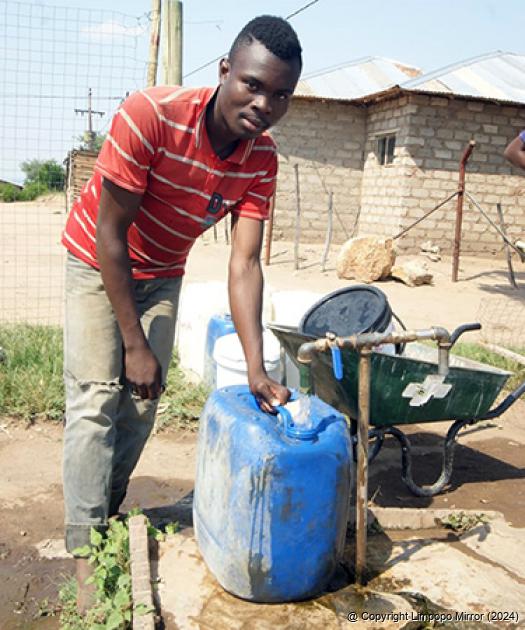

ADVERTISEMENT:

Ronewa Sadiki buys water from a neighbour at R2 per 20-litre bottle.
Life goes on in Hlanganani during lockdown
The day is sunny and, unlike most villages in Vhembe District, hardly any children are frolicking around the streets at Hlanganani RDP township on Friday afternoon. Some adults are seen moving up and down the streets, either rushing to a spaza shop or going only they know where.
The local community representative, Mr Aubrey Lambani, said that the police had come and harassed spaza-shop owners a few days ago, ordering them to close.
“It seems like they came to realise that they were doing a wrong thing, trying to put us under shutdown,” he said. “If they close spaza shops and we are left with nowhere to access basic food and other necessities, then it’s like we are being pushed to death.” He added that he had observed people walking along the streets to either the spaza shops or nearest complex along the R578 road without any masks on their faces.
“It’s like they rush to fetch the coronavirus on the outside and bring it into the township,” he said. “But then what do you expect our people to do when they can’t afford a mask? Here we’re speaking about a community of about 2 000 people, the majority of whom rely on social grants.”
Lambani said that the government, through its departments such as health or social development, should consider distributing free masks and sanitiser to the poorest of the poor communities if they want to curb the COVID-19 infection curve effectively. “We are still without water, and we have been without running water or tankers for as long as we can remember,” he said.
However, both Vhembe District Municipality and Mopani District Municipality are in the process of setting up water tanks in the waterless villages or sections, in a bid to lessen the difficulties of residents and as a way of minimizing the spread of COVID-19, since people need to utilise water most times to maintain hygiene.
“They have identified a spot where they say they are going to put up a 10 000-litre water tank,” Lambani said. “While we are happy about the water that they are bringing to us, we are worried that 10 000 litres are nothing to 2 000 people.”
A spaza-shop owner, Mr Goodman Chabalala, is following the government’s instructions of sanitising customers (and wearing masks as a precaution). “A larger part of what should have been my profit from the sales of the goods in the spaza shop is going towards buying a variety of anti-bacterial agents that we then mix together and offer to customers to wash their hands before entering the shop,” he said. “We mix clean water with Dettol, Jik bleach and dishwashing liquid soap – and we hope that the mixture is effective enough. I am seriously worried that some spaza shop owners here are not taking those sanitisation measures; they seem complacent or not caring at all.”
Residents continue to buy water from their neighbours who have borehole systems at R2 per 20-litre bottle. “To us bread has become a luxury, for we normally use money meant for bread to buy water,” said Ronewa Sadiki.
Vhembe District Municipality’s spokesperson Mr Matodzi Ralushai confirmed that the residents would get water, but he was out of office, so he was unable to state the date when they would be able to start using it.
A Grade 12 pupil, Nkhumeleni Mudau, said he was not certain how he was going to catch up once the schools reopened again. “We spend our days thinking about the coronavirus, so that even when we try to read in our own space as learners, we are unable to do so – our minds are clouded with fear from what we are reading in the media on COVID-19,” he said. “Coronavirus is real, and it fills us with fear.”
Date:09 April 2020
By: Tshifhiwa Mukwevho
Tshifhiwa Given Mukwevho was born in 1984 in Madombidzha village, not far from Louis Trichardt in the Limpopo Province. After submitting articles for roughly a year for Limpopo Mirror's youth supplement, Makoya, he started writing for the main newspaper. He is a prolific writer who published his first book, titled A Traumatic Revenge in 2011. It focusses on life on the street and how to survive amidst poverty. His second book titled The Violent Gestures of Life was published in 2014.
Read: 1268

ADVERTISEMENT

ADVERTISEMENT:

ADVERTISEMENT:

Recent Articles
-

Stiff penalties get issued to undisciplined SAFA Vhembe teams
18 April 2024 By Kaizer Nengovhela -

Battle of the Stars awaits in Sasol Women’s League
18 April 2024 By Frank Mavhungu -

Community threatens with shutdown if roads are not fixed
18 April 2024 By Elmon Tshikhudo -

Young Ravhuhali steers the ship successfully at Vhembe FM
18 April 2024 By Elmon Tshikhudo -

A new traditional leader gets installed at Phiphidi
18 April 2024 By Kaizer Nengovhela

ADVERTISEMENT

Popular Articles
-

Leopards’ top striker dreams of playing for Kaizer Chiefs
22 March 2024 By Frank Mavhungu -

Well-known inventor, Prof Mulalo Doyoyo, dies
14 March 2024 By Victor Mukwevho -

Lesley Manyathela stadium remains a 'white elephant' to local clubs
23 March 2024 By Kaizer Nengovhela -

Murder suspect appears in Mutale Court
22 February 2024 By Victor Mukwevho -

Masindi case likely to introduce new era of customary law
24 February 2024 By Anton van Zyl -

Park development leaves residents puzzled
22 March 2024 By Andries van Zyl -

Many questions as man shoot himself in the head
15 March 2024 By Elmon Tshikhudo

